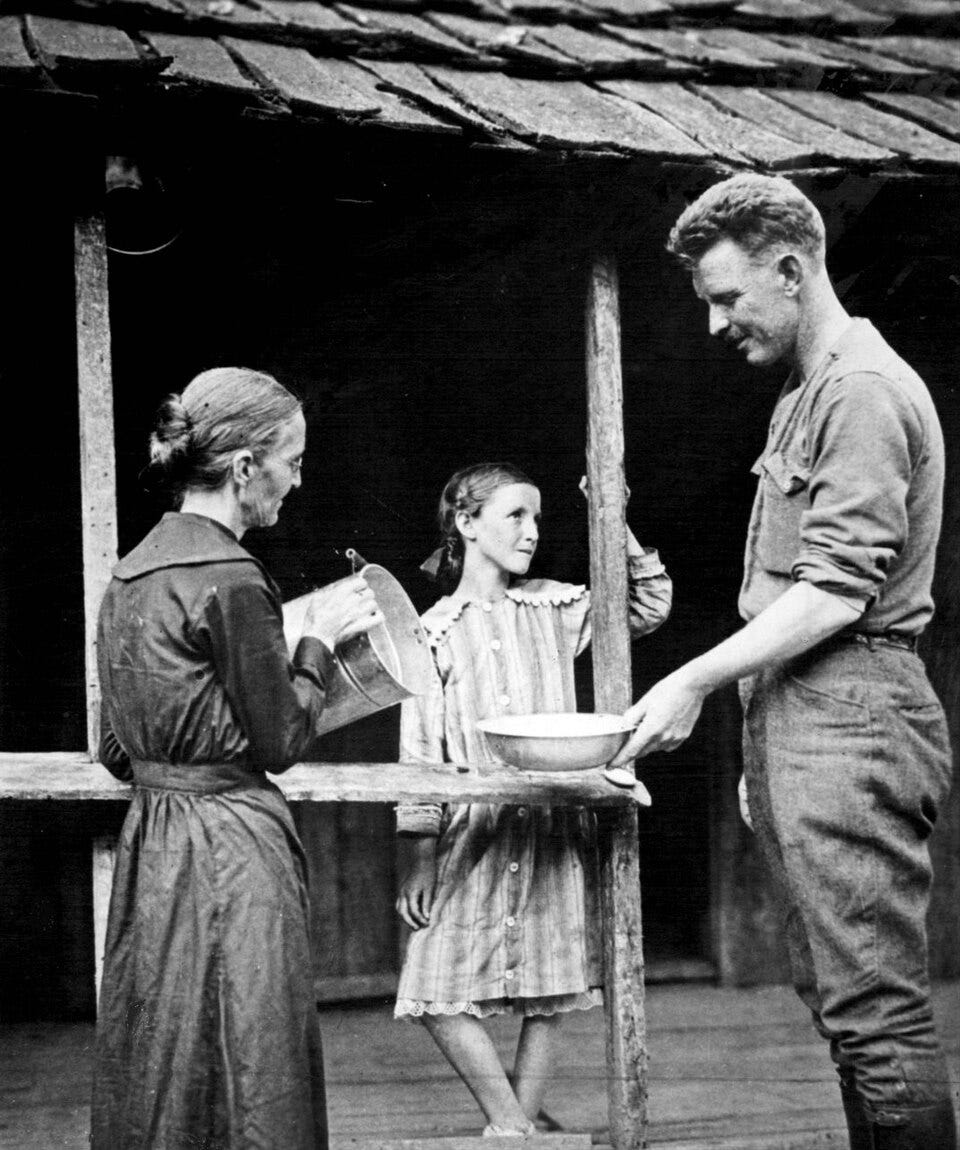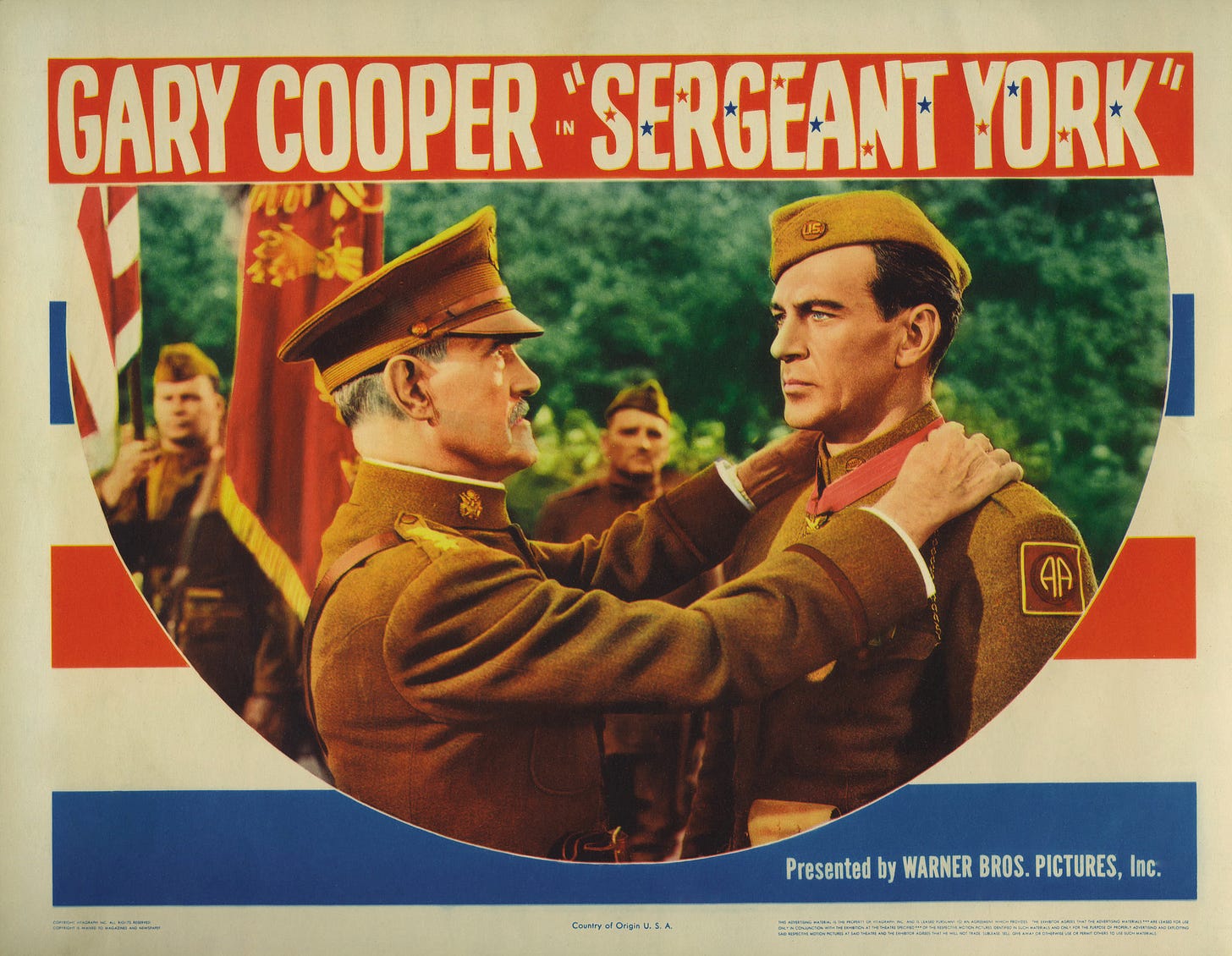There’s a parade in our Film of the Week, because there was a parade in real life, a ticker-tape parade through the streets of Manhattan to welcome back Sergeant Alvin York, the most decorated enlisted man in World War I. Yet York was the last man in the nation to crave such attention. One day, in fact, when York was on the set while this semi-biographical film was being made, somebody with intent to praise him asked him how many “Gerries” he had killed. York began to sob uncontrollably and had to leave the set, sick. For it really was true and no act. Alvin York had to be persuaded to enlist as a regular soldier rather than claim, as he tried very hard to do, to claim exception as a conscientious objector. In our film, check out the scene between the simple but strong-minded York and the officer who persuades him on moral grounds that it may be his duty to fight. There’s no sentimentality, no flag waving, no ridicule of York’s Christian faith; only two men of a shared faith, reasoning from principles they both accept.
But Alvin York (played with taciturn intensity by Gary Cooper, who won an Oscar for his performance) was not always so scrupulous. As the film shows, he led something of a wild young life, and that’s why the girl he loves, Gracie (Joan Leslie), refuses to have him. He must be convicted of the error of his ways, and that happens partly due to the influence of that good woman, and of his friend, the pastor of the church he’s long been ducking, Reverend Pile (Walter Brennan; he and Leslie were both nominated for Oscars for their supporting roles). But it also happens because of cruel disappointment, which I don’t want to reveal too much of, so as not to spoil your experience of the crucial turn in the film and in York’s life. The upshot is that York not only becomes a committed Christian; he abjures his old wild ways and his inclination to brawling and violence. Hence he does not want to go to war. This conflict in his heart is not just theoretical. It goes right to the center of who he once was and who he longs to become.
But leave it to a Tennessee backwoodsman, farmer, and frequent hunter of turkeys and other game birds to be a sharpshooter of the first rank. Think not only that York is well set up to excel in a battle of rifles. He needs also the moral reason to fight, the impulse, and this is also something I don’t want to specify too precisely, except to say that for York, the motive is not righteous anger against Germans, but affection for his comrades, especially for his friend from the big city, “Pusher” Ross (well played by George Tobias, whom you may recognize as Abner, the Stevens’ unflappable neighbor in the zany comedy show Bewitched). And what did Alvin York want from the national government after his heroic deeds? Nothing at all; but he got something anyway, namely the “bottom land” by the river that he’d wanted and worked so hard to obtain, so he could plow it and farm it and marry his beloved Gracie.
The film is splendidly acted all around; check out York’s loving and endlessly patient mother (Margaret Wycherley), and his kid brother (the much-celebrated child actor Dickie Moore). Sergeant York, I’ll say, is the inverse of Patton, that brilliant film whose central character loves war. But I have it on excellent authority that Patton himself had a deathbed conversion. In any case, this is another film by one of America’s finest and most intelligent directors, Howard Hawks, and don’t ever underestimate Gary Cooper, whose hands and face speak in silent moments more than other actors can speak in a thousand words. Maybe that’s one reason why the real Alvin York said he’d approve of a film on his life, only if Gary Cooper played him. Good choice, from a Tennessee farmer!
Click on the image above to watch today’s film on Internet Archive.
Note: Our full archive of over 1,000 posts, videos, audios is available on demand to paid subscribers, but our most recent free content remains open to all subscribers for some weeks after publication. We know that not everyone has time every day for a read and a listen. So we have built the archive with you all in mind. Please do browse, and please do share posts that you like with others.
Thank you, as always, for supporting our effort to restore every day a little bit of the good, the beautiful, and the true.






EXCELLENT
AWESOME
OUTSTANDING
One of the best films from Hollywood’s Golden Age!!!
As an aside … for some reason reading this article brought to mind my 2 favorite war-time poems …
…from WWI: “In Flanders Fields” by John McCrae
…from WWII: “High Flight” by John Gillespie Magee Jr
Don Young
Columbus OH